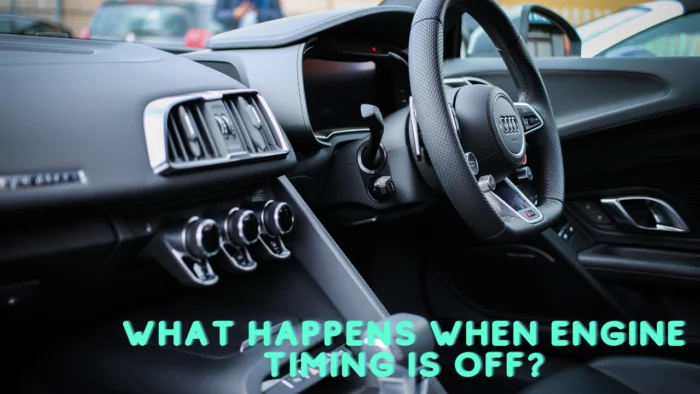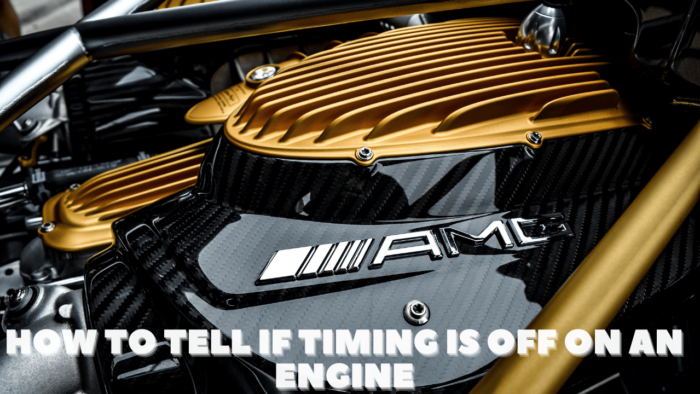The timing of an engine is a critical component of its performance and functionality. Proper engine timing ensures that the valves open and close at precise moments in synchronization with the movement of the pistons, allowing for efficient combustion and power generation.
However, when the timing is off, a range of issues can arise, impacting the engine’s performance, fuel efficiency, and overall reliability. In this blog, we will understand the signs, causes, and how to tell if timing is off on an engine.
What Causes Engine Timing to Be Off?
There are several factors that can throw off the engine timing. Some of these factors are:
- Timing Belt or Chain Wear: Over time, timing belts and chains can stretch, lose tension, or become damaged, leading to improper synchronization between the crankshaft and camshaft. This, in turn, causes the engine timing to be off.
- Incorrect Timing Belt or Chain Installation: Another reason why your engine’s timing may be off is incorrect installation of the timing belt or chain. During maintenance or repair, if the timing belt or chain is not properly installed according to the manufacturer’s specifications, it can result in misalignment, further leading to the engine having off timing.
- Engine Misfire: Did your engine have a misfire recently? If so, it could lead to bad engine timing. A misfiring engine can cause a disruption in the timing sequence, leading to serious timing issues.
- Faulty Timing Components: There are some other timing components that could cause an engine’s timing to be off. Some of these components are timing belt tensioners, timing chain guides, or idler pulleys. These components can easily wear out or fail and affect the timing system’s integrity.
- Jumped Timing: If the timing belt or chain skips a tooth or jumps a cog, the engine timing will be significantly affected.
So, let’s jump right in. How can you tell if the timing is off on an engine? We’ll take a look at this in the next section.
READ ALSO: The Importance of Regular Maintenance for Your Used Car
Signs that Your Engine Timing is Off: How to Diagnose It
Knowing how to tell if the timing is off on an engine is a good skill that every driver must have to enable them to take the quickest actions during repairs. Here’s are some clues that can tell if the timing is off on an engine:
- Difficulty Starting: One of the easiest ways to spot bad engine timing is when you begin to notice the engine having difficulty starting. If the engine has trouble starting or requires multiple attempts or prolonged cranking, it could be a sign of incorrect timing. So, whenever you hear any unusual sounds when you want to start your car or if the engine refuses to start, you can suspect that the timing is off on the engine.
- Rough Idling: If the engine is running unevenly or producing vibrations while idle, it may indicate a timing issue. You may notice vibrations, shaking, or a fluctuating RPM (revolutions per minute) when the engine is at idle. The engine may also feel unstable and struggle to maintain a smooth idle speed. These unusual or inconsistent engine movements should be pointers to show that the timing is off on an engine.
- Backfiring or misfiring: Another noticeable sign of incorrect engine timing is backfiring or misfiring. Backfiring occurs when the air-fuel mixture ignites outside the combustion chamber, resulting in loud pops or bangs from the exhaust or intake manifold. Misfires, which are incomplete combustion events, can also occur and cause rough running or hesitation during acceleration. These loud pops, bangs, or flames from the exhaust or intake manifold can be a result of improper engine timing.
- Decreased Power and Acceleration: Engine timing that is significantly off can lead to a noticeable decrease in power output and reduced acceleration. The engine may feel sluggish, lacking the usual responsiveness and smoothness. You may also struggle to reach higher speeds or experience a loss of power when climbing hills or overtaking.
- Engine Overheating: Improper engine timing can cause the engine to overheat. When there’s inefficient combustion, it leads to excess heat buildup, thereby placing additional stress on the cooling system. So keep an eye on the temperature gauge, and if you notice frequent or persistent overheating, it could be an indication of timing issues.
- Poor Fuel Efficiency: When the timing is off, the combustion process becomes less efficient, resulting in reduced fuel efficiency. Keep an eye on your vehicle’s fuel consumption for any sudden drops in mileage.
- Engine Knocking or Pinging: Detonation or pre-ignition can occur if the timing is too advanced. It produces knocking or pinging sounds from the engine. These sounds can also be an indication of timing issues.
These are some of the signs to look for if the timing is off on an engine. They could also signify other problems, but to be on the safe side, it is recommended to consult a professional mechanic who can perform a comprehensive diagnostic assessment using specialized tools such as a timing light or scan tool.
ALSO READ: Can too Much Oil Cause an Engine to Knock?

What To Do When Your Engine Timing is Off?
If you suspect or have confirmed that the engine timing is off or if you have a damaged timing component, it’s crucial to take appropriate action to rectify the issue. Ignoring timing problems can lead to further damage and potentially more expensive repairs. Here’s what you should do if you have damaged timing or suspect that the engine timing is off:
- Consult a professional mechanic: Engine timing is a complex and precise system, and it’s best to seek the expertise of a qualified mechanic. They will have the necessary knowledge, experience, and tools to accurately diagnose the timing issue and recommend the appropriate course of action.
- Avoid Driving the Vehicle: If you suspect damaged timing or if the engine timing is significantly off, it’s advisable to avoid driving the vehicle until the issue is resolved. Continuing to drive with incorrect timing can cause severe damage to the engine and other components, leading to more extensive repairs.
- Diagnostic Assessment: The mechanic will perform a comprehensive diagnostic assessment to determine the exact cause and extent of the timing problem. They may use specialized tools, such as a timing light or scan tool, to measure the timing values, inspect the timing components, and check for any related issues.
- Timing Component Replacement: If the timing belt or chain is damaged, worn, or stretched beyond its limits, it will need to be replaced. The mechanic will remove the old timing component and install a new one according to the manufacturer’s specifications. Additionally, any damaged or worn timing components, such as tensioners, guides, or pulleys, will also be replaced.
- Timing Adjustment: In some cases, the timing may be slightly off but doesn’t require a component replacement. The mechanic can adjust the timing by making precise adjustments to the timing belt or chain tension or by modifying the position of the camshaft or crankshaft.
- Comprehensive Inspection: Once the timing is repaired or adjusted, the mechanic will conduct a thorough inspection of the engine to ensure that all components are functioning correctly. They may also check for any secondary damage that may have occurred due to the timing issue.
- Test Drive and Verification: After the repairs, the mechanic will test drive the vehicle to ensure that the timing is now correct and that the engine operates smoothly. They will monitor the engine’s performance, check for any unusual sounds, and verify that the repaired timing has resolved the initial problem.
It’s important to know how to tell if timing is off on an engine and how to address timing issues promptly to prevent further damage. The earlier you identify the problem, the less time it takes to get the vehicle back in good condition.
To Conclude
Fixing engine timing problems quickly is very important. If you wait too long, it can cause serious engine damage and cost more to repair. Signs like rough idling or strange noises shouldn’t be ignored.
To stay ahead when buying a used car, always check a car’s repair and service history. Our vehicle history report shows past engine work, helping you avoid cars with timing issues. It’s a smart step before buying any used car for peace of mind.
Frequently Asked Questions
How do I know if my engine timing is correct?
You can determine if your engine timing is correct by consulting a professional mechanic who can use specialized tools, such as a timing light or scan tool, to measure and adjust the timing values according to the manufacturer’s specifications.
What causes engine timing to be off?
What happens when engine timing is off?
When engine timing is off, it can lead to a range of issues. These include rough idling, difficulty starting the engine, decreased power and acceleration, engine overheating, poor fuel efficiency, backfiring or misfiring, and potential damage to valves, pistons, or other engine components. It is crucial to address timing issues promptly to avoid further damage and ensure proper engine performance.
Is it safe to drive a vehicle if the timing is off?
Can a faulty timing cause damage to the engine?
What kind of noise does a car produce when the timing belt is worn out?
How to Tell if Timing is Off on an Engine?
Detecting if the timing is off in an engine is crucial for maintaining optimal performance and preventing potential damage. Here are steps to help you determine if the timing is off in an engine:
- Listen for Unusual Noises
- Check for Misfiring
- Inspect the Timing Belt/Chain
- Perform a Visual Inspection










